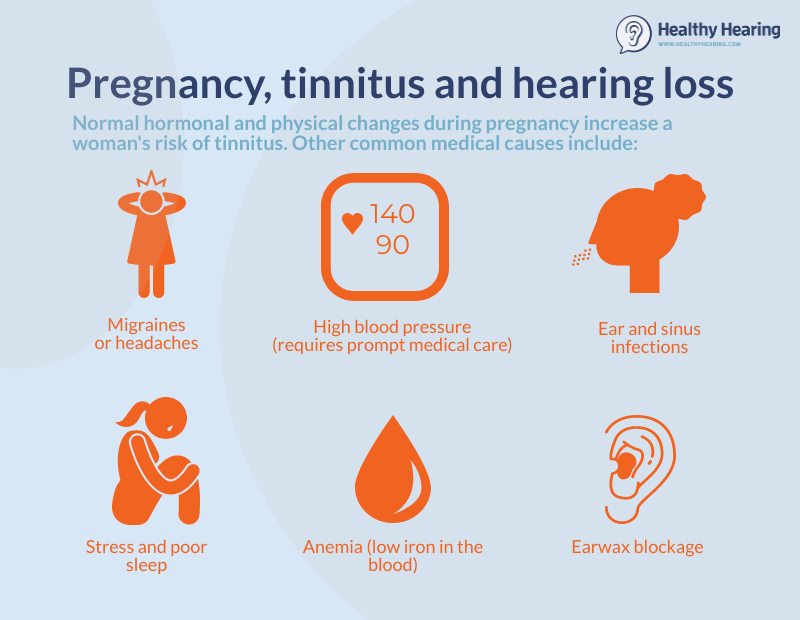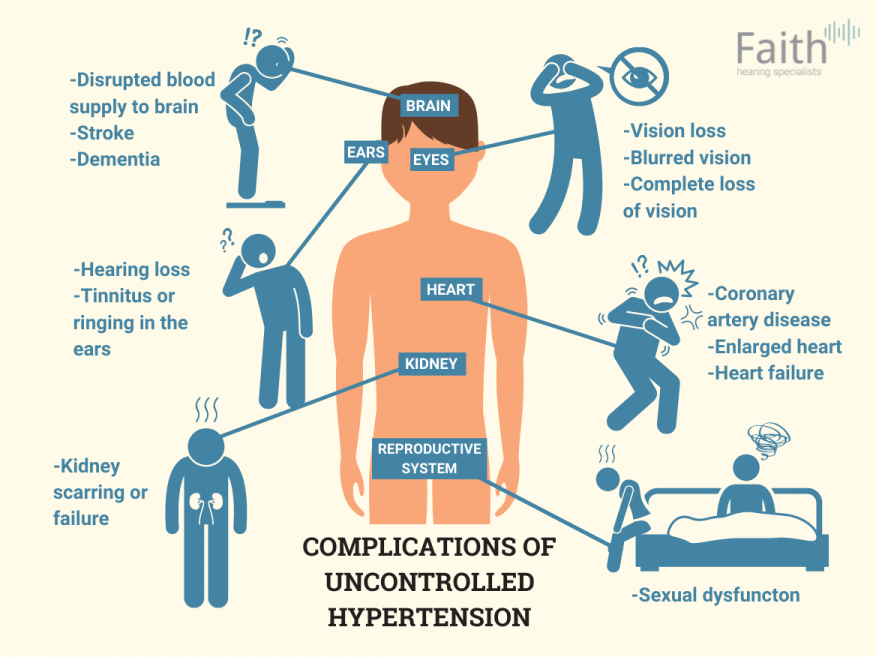High blood pressure can contribute to tinnitus, a ringing in the ears. Managing blood pressure may help reduce tinnitus symptoms.
A frequent condition known as tinnitus is characterized by buzzing, hissing, or ringing sounds in the ears. High blood pressure, also known as hypertension, can exacerbate tinnitus symptoms by causing changes in the blood flow to the inner ear. By addressing and managing high blood pressure through lifestyle changes, medication, and regular monitoring, individuals may experience relief from tinnitus symptoms.
It is important to consult with a healthcare professional for proper diagnosis and treatment to address both high blood pressure and tinnitus effectively.
The Link Between High Blood Pressure And Tinnitus
Millions of individuals worldwide suffer from hypertension, commonly referred to as high blood pressure.
It occurs when the force of the blood against the artery walls is consistently too high, leading to potential health complications. One of the lesser-known connections to high blood pressure is its link to tinnitus, a condition characterized by ringing, buzzing, or hissing sounds in the ears. Understanding this connection is crucial for individuals with high blood pressure who may also experience tinnitus.
Risk Factors For High Blood Pressure
Numerous variables can have an impact on high blood pressure, including
genetics, way of life, and underlying medical issues.
Some of the common risk factors for high blood pressure include:
- Family history of hypertension
- Poor diet high in sodium and low in potassium
- Lack of physical activity
- Obesity or being overweight
- Excessive alcohol consumption
- Chronic stress
The Basics Of Tinnitus
Tinnitus is a condition that manifests as a persistent perception of sound in the ears without any external source. It can be experienced as ringing, buzzing, hissing, or other sounds and may vary in intensity and frequency. While the exact cause of tinnitus is not always clear, it can be associated with various factors, including:
- Hearing loss
- Exposure to loud noise
- Ear infections or earwax buildup
- Cardiovascular conditions, including high blood pressure
- Neurological disorders
Effects Of High Blood Pressure On Tinnitus
High blood pressure, also known as hypertension, is a common condition that can have a significant impact on various aspects of health. One lesser-known effect of high blood pressure is its potential to exacerbate tinnitus, a condition characterized by ringing, buzzing, or other sounds in the ears. Understanding the effects of high blood pressure on tinnitus is crucial for individuals dealing with both of these conditions.
Increased Tinnitus Severity
High blood pressure can intensify the symptoms of tinnitus, leading to an increase in the severity and frequency of the perceived sounds. The elevated pressure within the blood vessels can contribute to a heightened perception of tinnitus, making it more bothersome and intrusive for individuals already struggling with the condition.
Impact On Quality Of Life
The combination of high blood pressure and tinnitus can significantly impact an individual’s quality of life. The constant ringing or buzzing in the ears, exacerbated by hypertension, can lead to heightened stress, anxiety, and difficulty concentrating. This can affect daily activities, work performance, and overall well-being, creating a substantial burden for those affected.
Managing High Blood Pressure To Alleviate Tinnitus
High blood pressure and tinnitus often go hand in hand, with the former exacerbating the symptoms of the latter. Managing high blood pressure can significantly alleviate tinnitus and improve overall quality of life. In this article, we will explore how lifestyle changes and medication options can help in managing high blood pressure to alleviate tinnitus.
Lifestyle Changes
Adopting a healthy lifestyle plays a crucial role in managing high blood pressure and alleviating tinnitus. Some effective lifestyle changes include:
- Eating a balanced diet low in sodium and saturated fats.
- taking part in frequent physical activities like cycling, swimming, or brisk walking.
- Limiting alcohol consumption.
- Avoiding exposure to loud noises, as it can worsen tinnitus symptoms.
Medication Options
When lifestyle changes alone are not sufficient, medication may be prescribed to manage high blood pressure and alleviate tinnitus. Common medication options include:
- Angiotensin-converting enzyme (ACE) inhibitors.
- Diuretics to help the body eliminate excess sodium and water.
- Calcium channel blockers to relax blood vessels.
- Beta-blockers to reduce the workload on the heart and lower blood pressure.

Credit: glwyenohearing.com
Holistic Approaches To Address High Blood Pressure And Tinnitus
When dealing with high blood pressure and tinnitus, taking a holistic approach can be beneficial in managing these conditions. Holistic approaches focus on addressing the root causes of these issues rather than just treating the symptoms. By incorporating stress management techniques, making dietary and exercise changes, and implementing other holistic practices, individuals can potentially find relief from high blood pressure and tinnitus.
Stress Management Techniques
Practicing mindfulness meditation, deep breathing exercises, and engaging in activities such as yoga or tai chi can help reduce stress levels. Additionally, incorporating regular relaxation techniques and finding time for hobbies can promote overall well-being and help alleviate the symptoms of high blood pressure and tinnitus.
Diet And Exercise Recommendations
Adopting a heart-healthy diet rich in fruits, vegetables, whole grains, and lean proteins can contribute to managing high blood pressure. Limiting sodium intake and avoiding processed foods can also be beneficial. Furthermore, engaging in regular physical activity, such as walking, swimming, or cycling, can help improve cardiovascular health and reduce stress, potentially alleviating symptoms of tinnitus.
Research Insights And Future Directions
Research Insights and Future Directions:
Current Studies On The Connection
Recent research has shed light on the relationship between high blood pressure and tinnitus.
Studies indicate that individuals with high blood pressure are more likely to experience tinnitus symptoms.
Potential Treatment Breakthroughs
Emerging treatments like sound therapy and cognitive behavioral therapy show promise in managing tinnitus.
Exploring the impact of blood pressure medications on tinnitus could lead to innovative treatment approaches.

Credit: www.healthyhearing.com

Credit: faithhearing.com
Frequently Asked Questions
What Does High Blood Pressure Tinnitus Sound Like?
High blood pressure tinnitus may sound like a pulsing or whooshing noise in the ears. It can vary in intensity and frequency. Seek medical assistance to ensure appropriate diagnosis and care.
Can High Blood Pressure Affect Your Ears?
Yes, high blood pressure can affect your ears. It can cause damage to the blood vessels in the inner ear, leading to hearing loss, tinnitus (ringing in the ears), or vertigo (dizziness). Controlling blood pressure through medication and lifestyle changes can help prevent these issues.
What Is The Simple Trick To Stop Tinnitus?
One simple trick to stop tinnitus is to manage stress levels through relaxation techniques like deep breathing or meditation.
Which Blood Pressure Medication Is Best For Tinnitus?
The blood pressure medication that is often recommended for tinnitus is a low-sodium diet and diuretics.
Conclusion
In managing high blood pressure and tinnitus, lifestyle changes and regular check-ups are crucial. Prioritizing your health and seeking professional guidance can improve your overall well-being. By understanding the connection between these conditions, you can take proactive steps towards better health.
Stay informed and take control of your health journey.


